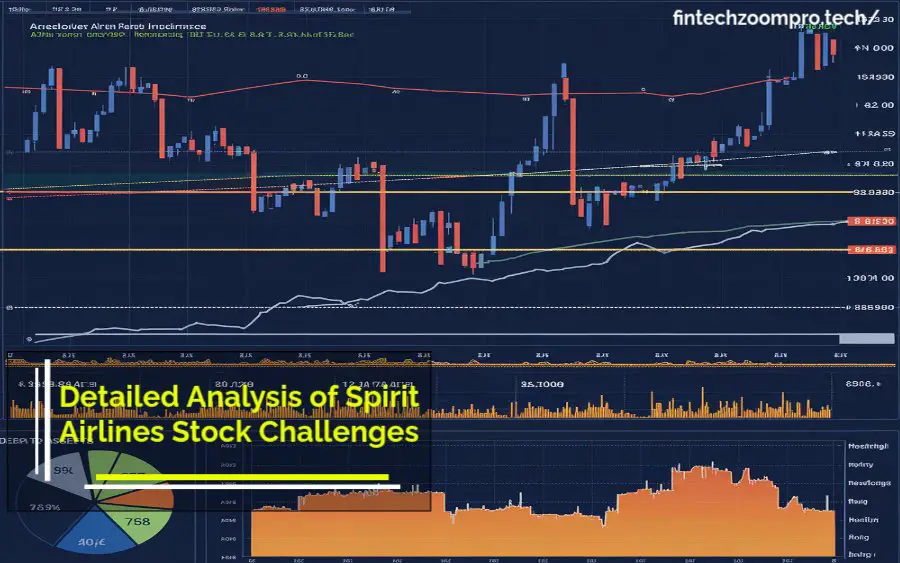Table of Contents
Spirit Airlines Stock Overview
- Current Status: Spirit Airlines’ stock is currently trading under the symbol “SAVEQ” on the OTC Pink Market, following its Chapter 11 bankruptcy filing in November 2024.
- Financial Performance: The airline has faced significant financial challenges, with a net income loss of $827.46 million in the trailing twelve months (TTM) and a market capitalization of approximately $54.71 million.
- Stock Performance: Historically, Spirit Airlines stock has been volatile, with a 52-week range of $0.060 to $1.570. The stock’s beta is 1.37, indicating higher volatility compared to the broader market.
Factors Influencing Spirit Airlines Stock
- Bankruptcy Filing: The recent bankruptcy filing has significantly impacted the stock’s value, as it often leads to delisting and restructuring, which can result in the devaluation or cancellation of shares.
- Competition and Operating Costs: Intense competition in the low-cost carrier market and rising operating costs, such as fuel prices, have pressured Spirit Airlines’ financial performance and stock price.
- Failed Merger Attempts: Unsuccessful merger negotiations with Frontier Airlines and JetBlue Airways have contributed to financial instability and investor uncertainty.
Future Outlook for Spirit Airlines Stock

- Restructuring Efforts: The airline’s future depends on the success of its restructuring plans, which may involve new investors or creditor agreements to stabilize its finances.
- Market Positioning: Spirit Airlines will need to reassess its market position and competitive strategy to regain stability and profitability post-bankruptcy.
- Analyst Forecasts: Despite the challenges, some analysts predict a potential upside for Spirit Airlines stock, though the consensus remains cautious due to ongoing financial struggles.
Risks and Considerations for Investors
- Delisting Risks: The potential delisting from U.S. exchanges could reduce liquidity and increase volatility for Spirit Airlines stock, making it less attractive to investors.
- Financial Risks: Buying Spirit Airlines stock now involves significant risks, including potential financial losses due to restructuring and delisting.
- Alternative Investments: Investors may consider alternative airline stocks like JetBlue or Frontier for more stable investment options
Introduction
- Spirit Airlines’ Recent Developments:
Spirit Airlines has filed for Chapter 11 bankruptcy protection, a move that has placed its stock under intense scrutiny.
The airline anticipates being delisted from U.S. stock exchanges, which could have profound implications for investors and the broader airline industry.
Key Points
Chapter 11 Bankruptcy Filing: This legal process allows the airline to restructure its debts while continuing operations.
Anticipated Delisting: The stock, currently trading over-the-counter under the symbol “SAVEQ,” may soon be removed from major exchanges.
Implications for Investors: Shareholders face potential financial losses due to the restructuring process.
Key Points for Spirit Airlines Stock

- Bankruptcy Filing: Spirit Airlines has sought Chapter 11 protection to manage its financial challenges.
- Expected Delisting: The airline’s stock is expected to be delisted from U.S. exchanges, impacting investor portfolios.
- Shareholder Impacts: Investors may experience significant financial impacts, including potential devaluation or cancellation of shares.
Main Content
Spirit Airlines’ Bankruptcy Filing
- Overview: Spirit Airlines’ decision to file for Chapter 11 bankruptcy protection is a strategic move to address its financial distress.
- Factors Leading to Bankruptcy:
- Failed Merger Attempts: Unsuccessful merger negotiations with Frontier Airlines and JetBlue Airways contributed to financial instability.
- Increased Operating Costs: Rising fuel prices and competitive pressures in the low-cost carrier market have strained the airline’s finances.
- Restructuring Support Agreement: The agreement aims to reorganize debts and improve financial stability, though details are still emerging.
Anticipated Stock Delisting
- Overview: The anticipated delisting of Spirit Airlines’ stock from U.S. exchanges is a direct consequence of its Chapter 11 proceedings.
- Delisting Process:
- Criteria: Stocks are typically delisted if they fail to meet exchange listing requirements, such as minimum stock price or market capitalization.
- Timeline: The exact timeline for delisting depends on the progress of bankruptcy proceedings and regulatory decisions.
- Implications for Investors: Delisting can reduce liquidity and increase volatility for Spirit Airlines stock, making it less attractive to investors.
Impact on Shareholders
- Overview: Shareholders are likely to face significant financial impacts due to the restructuring process.
- Potential Outcomes:
- Devaluation or Cancellation of Shares: Existing shares may lose value or be canceled as part of the restructuring.
- Legal and Financial Options: Investors may explore legal avenues or seek financial advice to mitigate losses.
Factors Leading to Financial Distress
- Overview: Several factors have contributed to Spirit Airlines’ financial challenges.
- Key Factors:
- Increased Operating Costs: Higher fuel costs and maintenance expenses have increased operational expenses.
- Competition in the Low-Cost Carrier Market: Intense competition from other low-cost airlines has pressured Spirit Airlines’ pricing strategy and profitability.
Future Outlook for Spirit Airlines Stock

- Overview: Post-bankruptcy, Spirit Airlines aims to restructure and improve its financial health.
- Proposed Restructuring Plans:
- Investor Involvement: The restructuring process may involve new investors or creditor agreements.
- Market Position and Strategy: The airline will need to reassess its market position and competitive strategy to regain stability.
FAQs
- What Does Spirit Airlines’ Bankruptcy Mean for Its Stockholders?
- Shareholders may experience significant losses as the restructuring process often leads to the devaluation or cancellation of existing shares.
- Will Spirit Airlines Continue Operations During the Bankruptcy Process?
- Yes, the airline plans to continue its operations as usual during Chapter 11 proceedings.
- What is the Current Stock Price of Spirit Airlines?
- The current stock price can be found on platforms like Yahoo Finance under the symbol “SAVEQ.”
- What is the Stock Symbol for Spirit Airlines?
- The stock symbol is currently “SAVEQ” on the OTC Pink Market.
- Why is Spirit Airlines Stock Under Scrutiny in 2024?
- The stock is under scrutiny due to the airline’s Chapter 11 bankruptcy filing and anticipated delisting from U.S. exchanges.
- How Has Spirit Airlines Stock Performed Historically?
- Historically, Spirit Airlines stock has faced volatility, especially in recent years due to financial challenges.
- What Factors Have Influenced the Recent Decline in Spirit Airlines Stock?
- Factors include increased operating costs, failed merger attempts, and competitive pressures.
- Is it a Good Time to Buy Spirit Airlines Stock?
- Given the current financial situation, buying Spirit Airlines stock is risky and should be approached with caution.
- How Does Spirit Airlines’ Bankruptcy Affect Its Stock Value?
- The bankruptcy significantly reduces the Spirit Airlines stock price due to potential delisting and restructuring impacts.
- What Are the Risks Associated with Buying Spirit Airlines Stock Now?
- Risks include potential delisting, reduced liquidity, and significant financial losses.
- What is the Future Outlook for Spirit Airlines Stock After Restructuring?
- The future outlook depends on the success of the restructuring efforts and the airline’s ability to regain financial stability.
- Should Investors Hold, Sell, or Buy Spirit Airlines Stock in 2024?
- Investors should carefully consider the risks and potential outcomes before making any decisions regarding Spirit Airlines stock.
- How Has Spirit Airlines Stock Reacted to Market Trends in the Airline Industry?
- The stock has been sensitive to broader airline industry trends, including competition and economic conditions.
- What is the Market Sentiment Surrounding Spirit Airlines Stock?
- Market sentiment is generally cautious due to the airline’s financial challenges.
- Are There Any Alternative Airline Stocks to Consider Over Spirit Airlines?
- Investors may consider other airline stocks like JetBlue or Frontier for more stable options.
- How Has Spirit Airlines’ Financial Performance Impacted Its Stock Price?
- Poor financial performance has led to a decline in the Spirit Airlines stock price.
- What Role Did Competition Play in the Decline of Spirit Airlines Stock?
- Competition from other low-cost carriers has significantly impacted Spirit Airlines’ pricing strategy and profitability.
- How Does the Potential Delisting from U.S. Exchanges Impact Spirit Airlines Shareholders?
- Delisting could reduce liquidity and increase volatility for shareholders, affecting the Spirit Airlines stock.
- Where Can I Find a Detailed Stock Chart for Spirit Airlines?
- Detailed stock charts for Spirit Airlines can be found on platforms like Yahoo Finance or Investing.com.
- How Do Spirit Airlines’ Stock Charts Compare to Competitors Like JetBlue and Frontier?
- Comparing stock charts can provide insights into relative performance and stability.
- What Technical Indicators Are Signaling a Buy or Sell for Spirit Airlines Stock?
- Technical indicators should be analyzed with caution given the current financial situation.
Detailed Analysis of Spirit Airlines Stock Challenges

Increased Operating Costs
- Fuel Prices: Rising fuel costs have significantly increased Spirit Airlines’ operational expenses. For instance, in 2022, fuel prices surged due to geopolitical tensions, impacting airlines globally.
- Maintenance Expenses: Higher maintenance costs due to aging fleets and regulatory requirements have also strained the airline’s finances.
Competition in the Low-Cost Carrier Market
- Market Dynamics: The low-cost carrier market is highly competitive, with airlines like Frontier and JetBlue offering similar services at competitive prices.
- Pricing Strategy: Spirit Airlines has faced challenges in maintaining profitability due to intense competition, which has pressured its pricing strategy.
Failed Merger Attempts
- Frontier Airlines Merger: The failed merger with Frontier Airlines was intended to create a stronger competitor in the low-cost market but ultimately did not materialize.
- JetBlue Airways Merger: The subsequent failed merger with JetBlue Airways further destabilized Spirit Airlines’ financial situation.
Impact of Bankruptcy on Shareholders
Potential Losses
- Devaluation of Shares: Existing shares may lose significant value or be canceled as part of the restructuring process.
- Legal and Financial Options: Investors may explore legal avenues or seek financial advice to mitigate potential losses.
Legal Considerations
- Bankruptcy Laws: Understanding bankruptcy laws and how they apply to shareholders is crucial for navigating this situation.
- Shareholder Rights: Shareholders have certain rights during bankruptcy proceedings, including the right to participate in creditor meetings.
Future Outlook and Restructuring Plans
Proposed Restructuring
- Investor Involvement: The restructuring process may involve new investors or creditor agreements to stabilize the airline’s finances.
- Market Positioning: Spirit Airlines will need to reassess its market position and competitive strategy to regain stability and profitability.
Market Position and Strategy
- Competitive Strategy: The airline must develop a robust competitive strategy to differentiate itself in the low-cost carrier market.
- Operational Efficiency: Improving operational efficiency through cost-cutting measures and optimizing routes can help regain profitability.
Alternative Airline Stocks
JetBlue Airways
- Stability and Performance: JetBlue has shown more stability in recent years, making it a potential alternative for investors.
- Market Position: JetBlue operates in both the low-cost and premium markets, offering a diverse range of services.
Frontier Airlines
- Growth Potential: Frontier has been expanding its operations and could offer growth potential for investors.
- Competitive Pricing: Frontier is known for its competitive pricing strategy, which appeals to budget-conscious travelers.
Technical Analysis of Spirit Airlines Stock
Stock Charts and Trends
- Historical Performance: Analyzing historical stock charts can provide insights into trends and volatility.
- Technical Indicators: Indicators like moving averages and relative strength index (RSI) can signal potential buy or sell opportunities.
Market Sentiment
- Investor Confidence: Market sentiment surrounding Spirit Airlines stock is cautious due to the airline’s financial challenges.
- News and Announcements: Investors closely follow news and announcements related to the airline’s restructuring efforts.
Conclusion
- Key Developments: Spirit Airlines’ Chapter 11 bankruptcy filing and anticipated delisting have placed its stock under scrutiny.
- Implications for Investors: Shareholders face potential financial losses, and the airline’s future depends on successful restructuring.
- Importance of Monitoring: Stakeholders should closely monitor developments for updates on the airline’s financial health and Spirit Airlines stock performance.
The Spirit Airlines stock price and Spirit airline stock price are closely watched due to these developments. Investors considering buying Spirit Airlines stock should be aware of these risks. The stock chart for Spirit Airlines provides valuable insights into its historical performance.
Additional Insights
Regulatory Environment
- Bankruptcy Laws: Understanding the regulatory framework surrounding bankruptcy is crucial for investors.
- Exchange Listing Requirements: Familiarity with exchange listing requirements can help investors anticipate potential delisting.
Economic Conditions
- Global Economic Trends: Broader economic conditions, such as inflation and interest rates, can impact the airline industry.
- Consumer Spending: Changes in consumer spending habits can affect demand for air travel and, consequently, airline stocks.
Industry Trends
- Sustainability Initiatives: The airline industry is increasingly focusing on sustainability, which could impact operational costs and investor appeal.
- Technological Advancements: Advances in technology, such as more efficient aircraft, can influence operational efficiency and profitability.
Extended FAQs
- How Does Spirit Airlines’ Bankruptcy Impact Its Employees?
- While the airline plans to continue operations, employees may face uncertainty regarding job security and benefits.
- What Role Does Government Support Play in Airline Restructuring?
- Government support can be crucial in providing financial aid or regulatory relief during restructuring processes.


